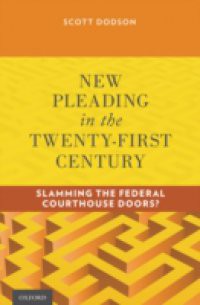New Pleading in the Twenty-First Century: Slamming the Federal Courthouse Doors? is the first book to comprehensively analyze, critique, and provide solutions for the new pleading regime in U.S. federal courts. In two recent decisions, the U.S. Supreme Court dramatically altered the pleadings landscape by imposing a version of fact pleading and merits screening--what the author calls New Pleading--that has not existed in the U.S. for 70 years. The result of this abrupt regime change is a broad, significant, and adverse effect on litigant access to civil justice. But because of its nascence, no scholar has provided a comprehensive, doctrinal, theoretical, and prospective look at what it means for U.S. federal civil procedure, both in the United States and in the larger global community. This book takes on that task. It synthesizes a theoretical account of New Pleading, argues that New Pleading is inconsistent with a system of procedural justice, and provides two distinct solutions for rectifying the inconsistency: return to Old Pleading or the adoption of New Discovery. Finally, this volume situates New Pleading and the solutions the author advocates in a wider international comparative context.



















